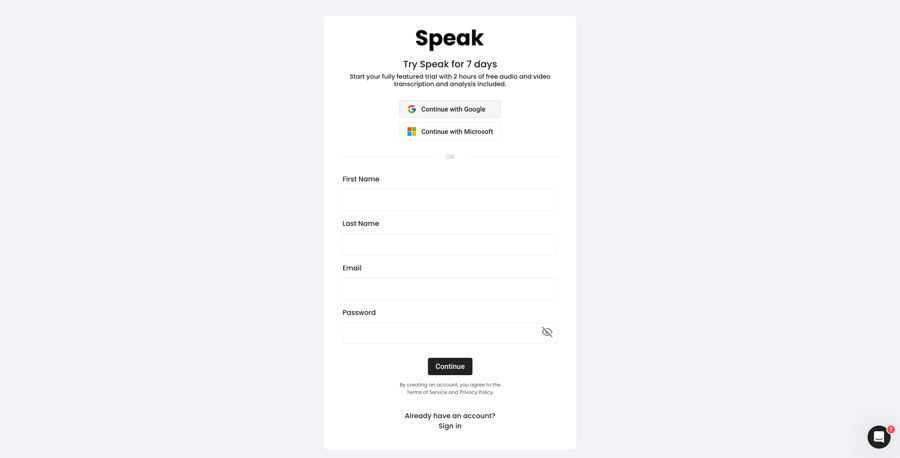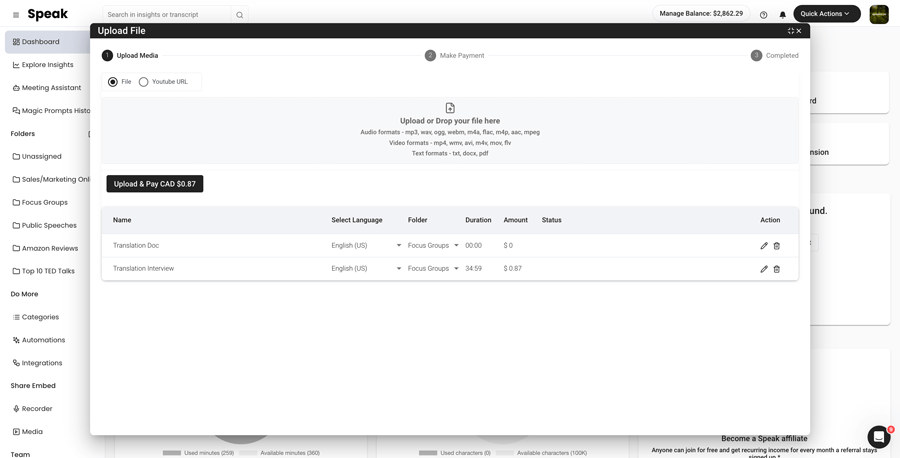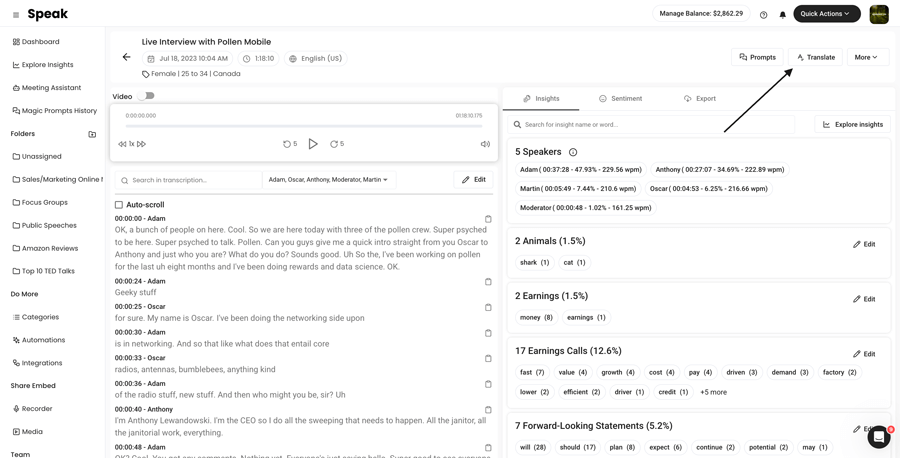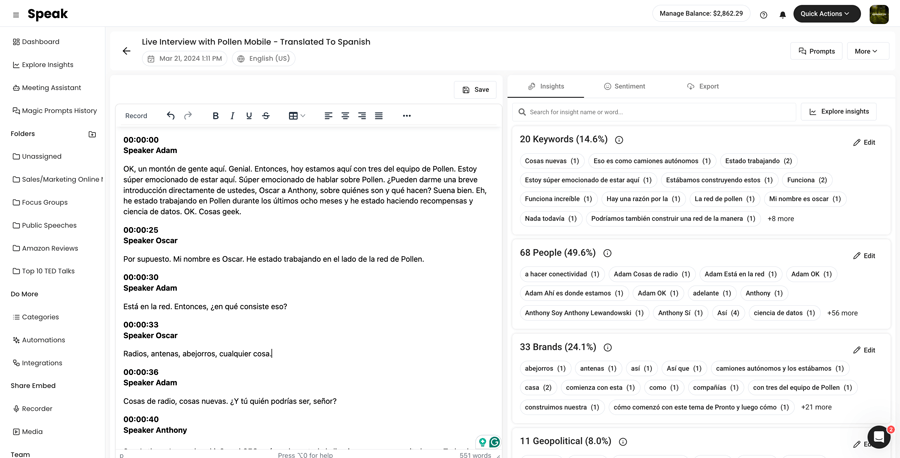How To Translate Japanese to Luxembourgish
Translating Japanese to Luxembourgish is super simple!

Step 1: Register for Speak
Register for Speak using this link.
Once you register, you can instantly begin translating your Japanese to Luxembourgish file(s).

Step 2: Upload Your Japanese file(s)
As soon as you log in, you will be redirected to the dashboard.
Once there, you can select the Quick Action "New Upload".
In Speak, you can seamlessly upload, transcribe and translate audio, video and text files all at once!

Step 3: Translate Your Japanese file(s) to Luxembourgish
Once the file is uploaded, simply visit your file and select "Translate".
If it is an audio and video file, Speak will ask you if you want to keep the speaker names and timestamps in the translation.
Want to translate many files at once? No problem!
You can view the files you want to automatically translate from Japanese to Luxembourgish from the folder level and instantly translate as many files as you need with our artificial intelligence translation in just a few clicks.

Step 4: That's It! View, Analyze, Modify & Export Your New Luxembourgish file(s)
Once the translation is done, you will be alerted and you will see a new document in the same folder your original file is in.
The file will be named the same but with a dash indicating that it is the translated version.
Need support with your Japanese translation?
We are always here and happy to help at Speak!
Just send us a message on live chat on the bottom right corner and we will ensure you are set up for success.
Interested in translating Japanese or other languages to different languages? View our entire list of supported translation languages here.
Automatic, accurate, instant AI translation from Japanese to Luxembourgish is here for you.
Register for Speak using this link and begin translating Japanese to Luxembourgish today.
Unlocking New Possibilities: Translate Japanese to Luxembourgish
In an ever-connected world, the ability to communicate across languages unlocks untold possibilities. From bridging cultural divides to opening up new avenues in research and business, the power of translation cannot be overstated. Today, we delve into the fascinating process of translating Japanese to Luxembourgish—two languages that epitomize the beauty and complexity inherent in global communication.
Introduction to AI Translation: A Game-Changer
With advancements in AI translation and Natural Language Processing (NLP), the barriers between languages are becoming more surmountable. Speak AI, a leader in NLP and transcription software, has been at the forefront of this revolution, integrating large language models, data visualization, and Generative AI to offer seamless translation services. Our AI Meeting Assistant feature, compatible with platforms like Microsoft Teams, Zoom, Google Meet, and Webex, exemplifies how technology is revolutionizing the translation industry, offering automatic transcription and analysis of meetings in real-time.
The Strategic Importance of Japanese to Luxembourgish Translation
Enhancing Cross-Cultural Communication
In a globalized economy, the ability to communicate across cultural and linguistic boundaries is invaluable. Translating content from Japanese to Luxembourgish opens up new channels for cultural exchange, fostering mutual understanding and respect between these two rich cultures.
Empowering Businesses and Researchers
For businesses and researchers operating between Japan and Luxembourg, accurate and efficient translation services are critical. From expanding market reach to conducting cross-border research, automatic translation tools significantly lower the barriers to entry in foreign markets and academic fields.
Benefits of Automatic Japanese to Luxembourgish Translation
Time and Cost Savings
Manually translating documents, audio, and video content from Japanese to Luxembourgish can be time-consuming and expensive. Automated translation technologies reduce reliance on human translators, speeding up the process and cutting costs considerably.
Accuracy and Consistency
Thanks to advancements in AI and machine learning, today's translation tools can achieve a high level of accuracy, ensuring that the meaning and nuance of the original content are retained. Plus, automatic translation ensures consistency in terminology, which is particularly important in legal and technical documents.
Understanding Japanese and Luxembourgish
Before we delve into the mechanics of translating between these two languages, let’s explore their origins, popularity, and unique traits.
Geographical Reach and Popularity
Japanese, an East Asian language, is predominantly spoken in Japan, with over 125 million speakers. Luxembourgish, on the other hand, is a West Germanic language spoken by about 600,000 people, primarily in Luxembourg.
Interesting Facts
Japanese
- Japanese consists of three scripts: Hiragana, Katakana, and Kanji.
- It is a language with a high context, meaning much is conveyed through implication rather than direct speech.
Luxembourgish
- Luxembourgish has undergone a revival, becoming the national language of Luxembourg in 1984.
- It is closely related to German and French, reflecting Luxembourg's geographical and cultural proximity to these countries.
Differences and Similarities
Cultural and Linguistic Nuances
While Japanese and Luxembourgish come from very different language families—Japonic and West Germanic, respectively—they share the importance of context in communication. However, the structure, grammar, and phonetics of these languages are vastly different, posing unique challenges in translation.
Translation Challenges and Solutions
One of the main challenges in translating Japanese to Luxembourgish is the significant difference in syntax and grammatical rules. AI-powered solutions, equipped with deep learning and an understanding of linguistic nuances, have become increasingly adept at navigating these complexities, offering translations that are not only accurate but also culturally and contextually relevant.
Concluding Thoughts
As our world grows smaller, the need for robust, efficient, and accurate translation services becomes ever more critical. The translation of Japanese to Luxembourgish, while niche, symbolizes the broader possibilities and challenges inherent in bridging the human language divide. With technologies like those developed by Speak AI, the dream of a fully connected world, unhindered by language barriers, moves ever closer to reality.
Whether for businesses expanding their global footprint, researchers conducting multilingual studies, or communities seeking deeper cultural understanding, the value of translating Japanese to Luxembourgish—and indeed, any pair of languages—is immeasurable. In embracing these technologies, we open ourselves to a world of infinite possibilities, bound only by the limits of our curiosity and imagination.
At Speak AI, we are committed to driving advancements in automatic translation, leveraging our expertise in NLP, large language models, and AI to empower our users. With a 4.9 rating on G2 and over 150K satisfied users, we stand ready to transform your communication needs. Explore the future of translation with us and experience the power of understanding, no matter the language.
Translate Japanese To These Other Supported Languages:
- Translate Japanese-to-Afrikaans
- Translate Japanese-to-Albanian
- Translate Japanese-to-Amharic
- Translate Japanese-to-Arabic (Egypt)
- Translate Japanese-to-Arabic (Iraq)
- Translate Japanese-to-Arabic (Israel)
- Translate Japanese-to-Arabic (Jordan)
- Translate Japanese-to-Arabic (Kuwait)
- Translate Japanese-to-Arabic (Lebanon)
- Translate Japanese-to-Arabic (Oman)
- Translate Japanese-to-Arabic (Palestinian Authority)
- Translate Japanese-to-Arabic (Qatar)
- Translate Japanese-to-Arabic (Saudi Arabia)
- Translate Japanese-to-Arabic (Syrian Arab Republic)
- Translate Japanese-to-Arabic (United Arab Emirates)
- Translate Japanese-to-Arabic Modern Standard (Bahrain)
- Translate Japanese-to-Armenian
- Translate Japanese-to-Assamese
- Translate Japanese-to-Aymara
- Translate Japanese-to-Azerbaijani
- Translate Japanese-to-Bambara
- Translate Japanese-to-Basque
- Translate Japanese-to-Belarusian
- Translate Japanese-to-Bengali
- Translate Japanese-to-Bhojpuri
- Translate Japanese-to-Bosnian
- Translate Japanese-to-Bulgarian
- Translate Japanese-to-Catalan
- Translate Japanese-to-Cebuano
- Translate Japanese-to-Chinese (Simplified)
- Translate Japanese-to-Chinese (Traditional)
- Translate Japanese-to-Corsican
- Translate Japanese-to-Croatian
- Translate Japanese-to-Czech
- Translate Japanese-to-Danish
- Translate Japanese-to-Dari
- Translate Japanese-to-Dhivehi
- Translate Japanese-to-Dogri
- Translate Japanese-to-Dutch
- Translate Japanese-to-English
- Translate Japanese-to-English (Australia)
- Translate Japanese-to-English (Indian)
- Translate Japanese-to-English (Irish)
- Translate Japanese-to-English (New Zealand)
- Translate Japanese-to-English (Scottish)
- Translate Japanese-to-English (South African)
- Translate Japanese-to-English (United Kingdom)
- Translate Japanese-to-English (United States)
- Translate Japanese-to-Esperanto
- Translate Japanese-to-Estonian
- Translate Japanese-to-Ewe
- Translate Japanese-to-Farsi (Persian)
- Translate Japanese-to-Filipino Tagalog
- Translate Japanese-to-Finnish
- Translate Japanese-to-French
- Translate Japanese-to-French (Canada)
- Translate Japanese-to-Frisian
- Translate Japanese-to-Galician
- Translate Japanese-to-Georgian
- Translate Japanese-to-German
- Translate Japanese-to-German (Swiss)
- Translate Japanese-to-Greek
- Translate Japanese-to-Guarani
- Translate Japanese-to-Gujarati
- Translate Japanese-to-Haitian Creole
- Translate Japanese-to-Hausa
- Translate Japanese-to-Hawaiian
- Translate Japanese-to-Hebrew
- Translate Japanese-to-Hindi
- Translate Japanese-to-Hmong
- Translate Japanese-to-Hungarian
- Translate Japanese-to-Icelandic
- Translate Japanese-to-Igbo
- Translate Japanese-to-Ilocano
- Translate Japanese-to-Indonesian
- Translate Japanese-to-Irish
- Translate Japanese-to-Italian
- Translate Japanese-to-Japanese
- Translate Japanese-to-Javanese
- Translate Japanese-to-Kannada
- Translate Japanese-to-Kazakh
- Translate Japanese-to-Khmer
- Translate Japanese-to-Kinyarwanda
- Translate Japanese-to-Konkani
- Translate Japanese-to-Korean
- Translate Japanese-to-Krio
- Translate Japanese-to-Kurdish
- Translate Japanese-to-Kurdish (Sorani)
- Translate Japanese-to-Kyrgyz
- Translate Japanese-to-Lao
- Translate Japanese-to-Latin
- Translate Japanese-to-Latvian
- Translate Japanese-to-Lingala
- Translate Japanese-to-Lithuanian
- Translate Japanese-to-Luganda
- Translate Japanese-to-Luxembourgish
- Translate Japanese-to-Macedonian
- Translate Japanese-to-Maithili
- Translate Japanese-to-Malagasy
- Translate Japanese-to-Malay
- Translate Japanese-to-Malayalam
- Translate Japanese-to-Maltese
- Translate Japanese-to-Maori
- Translate Japanese-to-Marathi
- Translate Japanese-to-Meiteilon (Manipuri)
- Translate Japanese-to-Mizo
- Translate Japanese-to-Mongolian
- Translate Japanese-to-Myanmar (Burmese)
- Translate Japanese-to-Nepali
- Translate Japanese-to-Norwegian
- Translate Japanese-to-Nyanja (Chichewa)
- Translate Japanese-to-Odia (Oriya)
- Translate Japanese-to-Oromo
- Translate Japanese-to-Pashto
- Translate Japanese-to-Persian
- Translate Japanese-to-Polish
- Translate Japanese-to-Portuguese
- Translate Japanese-to-Portuguese (Brazilian)
- Translate Japanese-to-Portuguese (Portugal)
- Translate Japanese-to-Punjabi
- Translate Japanese-to-Quechua
- Translate Japanese-to-Romanian
- Translate Japanese-to-Russian
- Translate Japanese-to-Samoan
- Translate Japanese-to-Sanskrit
- Translate Japanese-to-Scots Gaelic
- Translate Japanese-to-Sepedi
- Translate Japanese-to-Serbian
- Translate Japanese-to-Sesotho
- Translate Japanese-to-Shona
- Translate Japanese-to-Sindhi
- Translate Japanese-to-Sinhala
- Translate Japanese-to-Sinhala (Sinhalese)
- Translate Japanese-to-Slovak
- Translate Japanese-to-Slovenian
- Translate Japanese-to-Somali
- Translate Japanese-to-Spanish
- Translate Japanese-to-Spanish (Mexico)
- Translate Japanese-to-Sundanese
- Translate Japanese-to-Swahili
- Translate Japanese-to-Swedish
- Translate Japanese-to-Tajik
- Translate Japanese-to-Tamil
- Translate Japanese-to-Tatar
- Translate Japanese-to-Telugu
- Translate Japanese-to-Thai
- Translate Japanese-to-Tigrinya
- Translate Japanese-to-Tsonga
- Translate Japanese-to-Turkish
- Translate Japanese-to-Turkmen
- Translate Japanese-to-Twi (Akan)
- Translate Japanese-to-Ukrainian
- Translate Japanese-to-Urdu
- Translate Japanese-to-Uyghur
- Translate Japanese-to-Uzbek
- Translate Japanese-to-Vietnamese
- Translate Japanese-to-Welsh
- Translate Japanese-to-Xhosa
- Translate Japanese-to-Yiddish
- Translate Japanese-to-Yoruba
- Translate Japanese-to-Zulu



